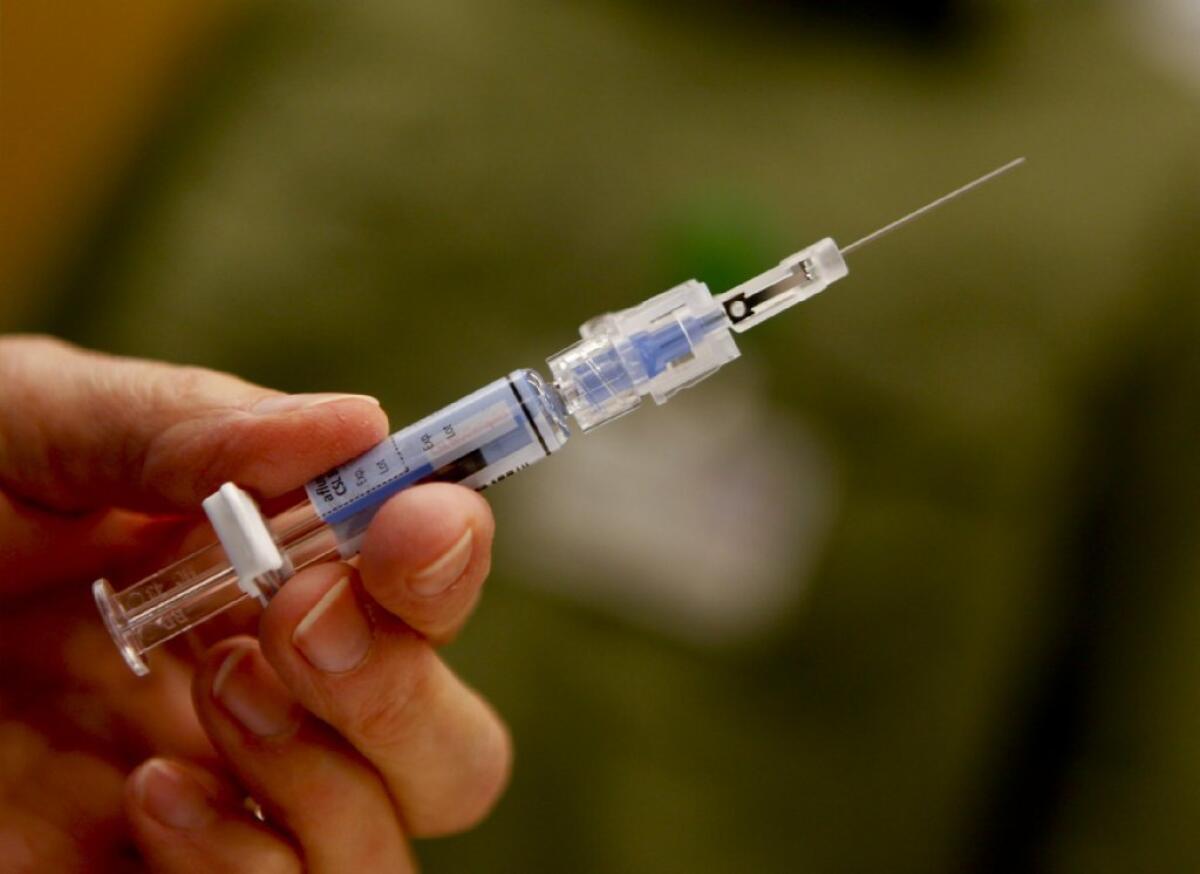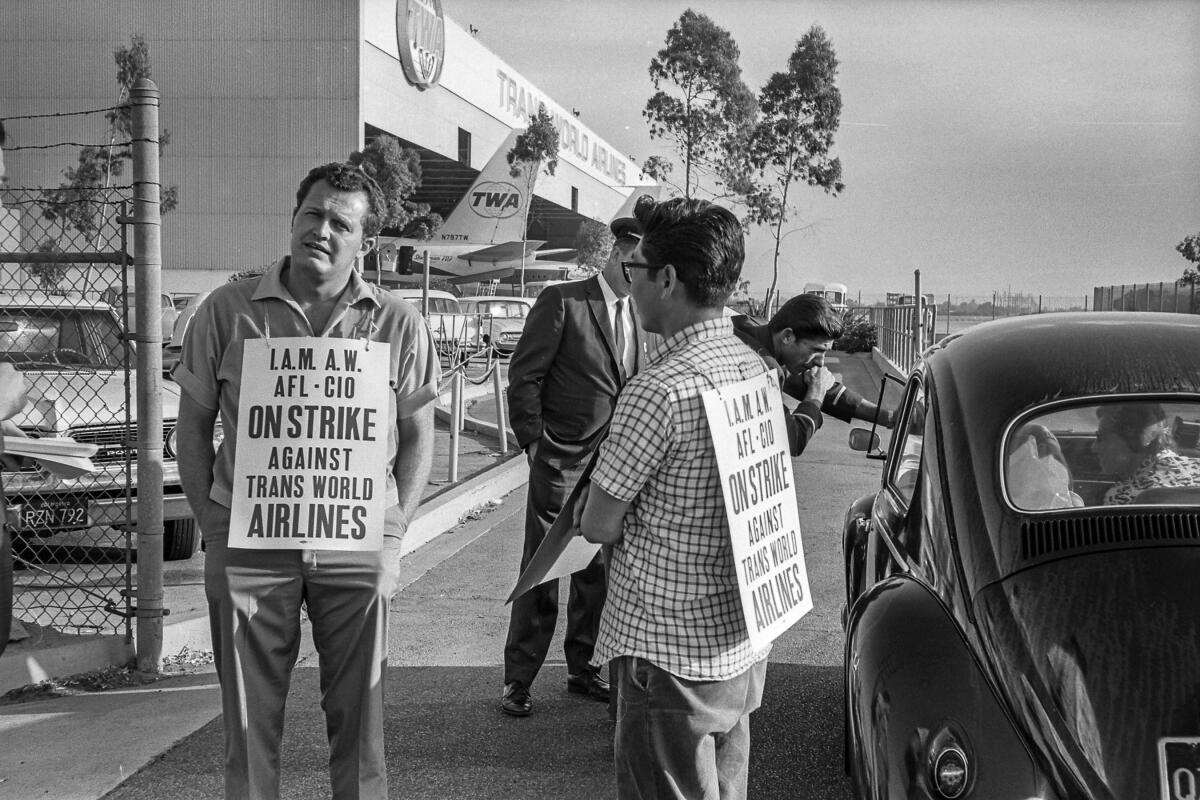Newsletter: Sharp questions for syringe suppliers

- Share via
If there’s a COVID-19 vaccine, will there be enough syringes in the U.S.? Two small companies will be key.
TOP STORIES
Sharp Questions for Syringe Suppliers
As the Trump administration races to buy hundreds of millions of syringes for what is likely to be an unprecedented COVID-19 immunization campaign, success depends heavily on two small medical supply companies with little track record of fulfilling government orders of that magnitude.
Start your day right
Sign up for Essential California for the L.A. Times biggest news, features and recommendations in your inbox six days a week.
You may occasionally receive promotional content from the Los Angeles Times.
Retractable Technologies Inc., based in Little Elm, Texas, announced an $83.8-million government contract in May to provide an undisclosed number of syringes and needles for use with a potential COVID-19 vaccine. In dollar terms, the single order is double the company’s entire 2019 revenue, according to filings with the Securities and Exchange Commission.
The publicly traded company, which has been trying for years to become a bigger player in the syringe market, saw its stock price more than double after the order became public.
A second order — for $27.4 million worth of syringes and needles, with an option to go up to $54 million — went to privately held Marathon Medical Corp., an Aurora, Colo.-based medical distribution company that has no factories of its own and acts largely as a middleman.
Although the scientific race to develop a vaccine gets the most public attention, the massive orders for syringes illustrate how many less-glamorous steps the government needs to get right to carry out a vaccination campaign.
More Top Coronavirus Headlines
— The personal protective gear that was in dangerously short supply during the early weeks of the coronavirus crisis in the U.S. is running low again as the virus resumes its rapid spread and the number of hospitalized patients climbs. Meanwhile, presumptive Democratic presidential nominee Joe Biden is promising to shift production of medical equipment and other key pandemic-fighting products “back to U.S. soil,” creating jobs and bolstering the domestic supply chain.
— President Trump is exhorting the nation’s public schools to reopen, even as cases are rising in 38 states, including an outbreak at childcare facilities in Texas. But such enthusiasm is far from unanimous among parents, teachers and health experts.
— A new survey finds that allowing Los Angeles County residents to leave their homes and venture back into public life has improved mental health. But anxiety over the spread of the coronavirus persists.
— The Trump administration has formally notified the United Nations of its withdrawal from the World Health Organization, although the pullout won’t take effect until next year, meaning it could be rescinded under a new administration or if circumstances change.
— L.A. County‘s coronavirus surge has worsened with 4,015 additional cases Tuesday — the highest number of infections the county has reported in a single day. And for the first time, Orange County residents reported more than 1,000 new coronavirus cases in one day, with younger people accounting for the bulk of new infections.
For more, sign up for Coronavirus Today, a special edition of The Times’ Health and Science newsletter.
This Time, It’s Personal
There’s no shortage of criticism of President Trump from those who used to be in his inner circle. But the latest Trump tell-all, from his estranged niece, is personal.
In a scathing 240-page book, Mary Trump, a clinical psychologist, writes that her uncle’s upbringing in a deeply dysfunctional family makes him a uniquely destructive and unstable leader for the country. She describes the president as deeply insecure and unscrupulous, saying he paid a friend to take his SAT so he could get into college, and she accuses him of “twisted behaviors” and “cheating as a way of life,” citing a lifelong habit of lying.
“Too Much and Never Enough: How My Family Created the World’s Most Dangerous Man,” which is scheduled to be released on Tuesday, portrays the president as almost pitifully desperate for affirmation and provides a harsh contrast to Trump’s self-made image as a tough and successful businessman. More than any modern president, Trump has gone to extraordinary lengths to conceal or distort major details of his private life.
UC System’s Historic Moment
Michael V. Drake, a national champion for access and equity who previously headed Ohio State University and UC Irvine, has been named the new president of the University of California and the first Black leader in the system’s 152-year history.
On Tuesday, the UC Board of Regents seized a historic opportunity to hire a person of color to head a system whose 285,000 students are now majority people of color, as the nation grapples with a sweeping racial reckoning. He will succeed President Janet Napolitano, who will step down Aug.1 after seven years.
Drake, who will turn 70 on Thursday, brings leadership experience, academic credentials, political savvy and personal qualities to that position at a time of deep challenges facing the UC system. Among them: a global pandemic, financial uncertainty and demands to further diversify campuses and defund UC police.
Was It the ‘Blue Flu’?
It had been a month of upheaval for police, with unprecedented protests over police killings of Black people and the Los Angeles City Council agreeing to cut the LAPD’s budget by $150 million amid calls for sweeping reforms. Then, an unsigned letter circulated among the Los Angeles Police Department rank and file last week, encouraging officers to call in sick to protect their own interests.
Now, LAPD commanders are investigating whether an unusual surge in officers calling in sick over the Fourth of July weekend was the result of an orchestrated protest or labor action, which would be illegal. Sources in the department told The Times up to 300 officers called in sick in what many in the department suspect was a “blue flu.”
Police Chief Michel Moore said there could be several reasons why officers called in sick, particularly given rising COVID-19 cases within the force and throughout L.A. County. But he also acknowledged signs that certain officers and units called in as part of a concerted action.
FROM THE ARCHIVES
On this day in 1966, the International Assn. of Machinists union went on strike. It was action against five airlines — TWA, United, Northwest, National and Eastern — but the impact was felt nationally: Sixty percent of U.S. commercial air traffic was grounded as 35,000 workers from various unions refused to work, according to The Times.
The strike ultimately lasted 43 days. President Lyndon B. Johnson’s staff unsuccessfully attempted to settle the dispute twice before an agreement was reached in August 1966. The union won a 6% pay increase.

Want more of the Los Angeles Times archives? We’re on Instagram.
CALIFORNIA
— The L.A. County Board of Supervisors is looking at what it would take to close the decrepit Men’s Central Jail, where thousands of inmates are held in cramped cells, with no replacement for the jail. Instead, the supervisors want to focus on treating the mental health needs of the thousands of people who come in and out of the jail system
— As protests against police brutality go global, a group of Latina moms in Lincoln Heights, Boyle Heights and East L.A. is also fighting in memory of the sons they lost to encounters with law enforcement.
— Former L.A. City Councilman Mitchell Englander has pleaded guilty to a single felony charge in the ongoing corruption probe of City Hall, admitting he schemed to prevent federal investigators from learning about cash and other freebies he received from a Southern California businessman.
— About 100 San Diego residents have volunteered to test a COVID-19 vaccine in a type of study known as known as a human challenge trial. Experts say it may help develop a vaccine faster, but it also comes at risk to the volunteers.
Support our journalism
Subscribe to the Los Angeles Times.
NATION-WORLD
— International students will be forced to leave the U.S. or transfer to another college if their schools offer classes entirely online this fall, under new guidelines issued by federal immigration authorities.
— New Jersey and Delaware held primary elections that were almost entirely by mail.
— Brazil’s President Jair Bolsonaro says he has tested positive for COVID-19 after months of downplaying the virus’ severity.
— Australia had been among the world’s most successful countries in containing its coronavirus outbreak. But the virus has resumed spreading at an alarming rate in Melbourne, while new extreme measures have ignited anger and arguments over who is to blame.
HOLLYWOOD AND THE ARTS
— COVID-19 survivor Tom Hanks is baffled by people who don’t take the disease seriously: “The idea of doing one’s part, though, should be so simple: Wear a mask, social distance, wash your hands.”
— For Israeli actress Shira Haas, starring in Netflix’s “Unorthodox” has been “a gift for me.”
— In HBO’s “I Know This Much Is True,” Mark Ruffalo faced the challenge of playing not one but two complicated roles: a pair of twins on a journey of forced self-discovery.
— James Corden talks about how the coronavirus changed his late-night style, on the latest episode of our podcast “Can’t Stop Watching.”
BUSINESS
— Novavax Inc., one of the front-runners in the race to develop a COVID-19 vaccine, will receive $1.6 billion from the U.S. government, the biggest contribution yet from the Operation Warp Speed program.
— TikTok said it will stop operations in Hong Kong, joining other social media companies in warily eyeing ramifications of a sweeping national security law that took effect last week.
SPORTS
— The Dodgers and the Angels have declined to explain the absences of players from their training camps. For the Dodgers, seven haven’t joined the team; for the Angels, as many as 10.
— Brad Pye Jr. has died at 89. He was the first Black sports broadcaster in Los Angeles who rose through the ranks as a leader and administrator at news agencies, sports organizations and city services.
Free online games
Get our free daily crossword puzzle, sudoku, word search and arcade games in our new game center at latimes.com/games.
OPINION
— Kicking racists off social media doesn’t threaten free speech. It protects it, columnist Mary McNamara writes.
— We still don’t know enough about what’s causing COVID-19 to surge, The Times’ editorial board writes. That keeps us from fighting back effectively.
WHAT OUR EDITORS ARE READING
— An open letter in Harper’s, signed by writers and artists including Margaret Atwood and Wynton Marsalis, warns of an “intolerant climate” and argues for openness to “opposing views.” Not surprisingly, debate has immediately ensued. (Harper’s, New York Times)
— Three airline industry companies slated to receive $338 million in public money designed to preserve jobs in the hard-hit industry have laid off thousands of workers anyway, according to Treasury disclosure filings and public layoff data. (ProPublica)
ONLY IN CALIFORNIA
When a big rig caught fire on Interstate 8 in San Diego County shortly before noon Monday, the incident caused a miles-long backup — and a barbecue of sorts. Inside the trailer were 41,000 pounds of pork. The trailer was a total loss, Lakeside Fire Protection District Division Chief John Hisaw said. “It’s about lunchtime, so as they pulled up here, the guys are already getting hungry now,” Hisaw told OnScene TV, as firefighters doused the meat to put out hot spots.
Comments or ideas? Email us at [email protected].
Sign up for Essential California
The most important California stories and recommendations in your inbox every morning.
You may occasionally receive promotional content from the Los Angeles Times.



